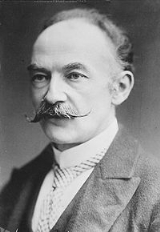
(2 June 1840 – 11 January 1928) was an English novelist and poet. While his works typically belong to the Naturalism
movement, several poems display elements of the previous Romantic
and Enlightenment periods of literature, such as his fascination with the supernatural.
While he regarded himself primarily as a poet who composed novels mainly for financial gain, he became and continues to be widely regarded for his novels, such as Tess of the d'Urbervilles
and Far from the Madding Crowd
.
To discover evil in a new friend is to most people only an additional experience![]()
With all, the beautiful things of the earth become more dear as they elude pursuit; but with some natures utter elusion is the one special event which will make a passing love permanent for ever.![]()
To dwellers in a wood almost every species of tree has its voice as well as its feature. At the passing of the breeze the fir-trees sob and moan no less distinctly than they rock; the holly whistles as it battles with itself; the ash hisses amid its quiverings; the beech rustles while its flat boughs rise and fall.![]()
Good, but not religious-good.![]()
Of course poets have morals and manners of their own, and custom is no argument with them.![]()
Like the British Constitution, she owes her success in practice to her inconsistencies in principle.![]()
A lover without indiscretion is no lover at all. Circumspection and devotion are a contradiction in terms.![]()
You calculated how to be uncalculating, and are natural by art!![]()
I have seldom known a man cunning with his brush who was not simple with his tongue; or, indeed, any skill in particular that was not allied to general stupidity.![]()

